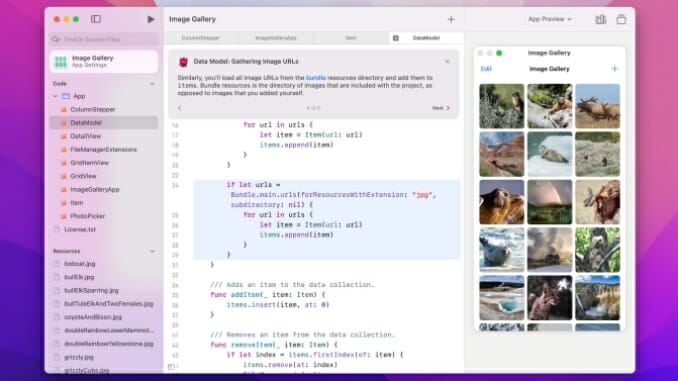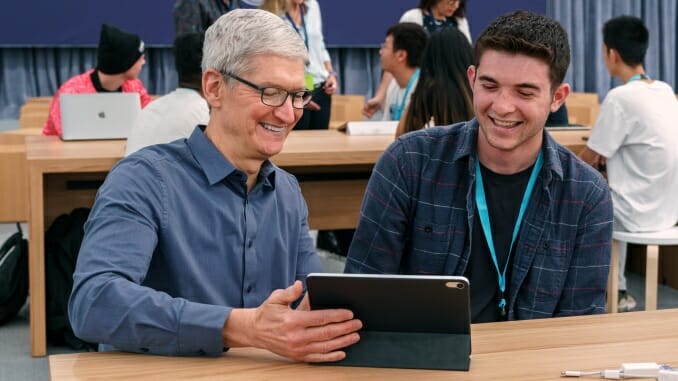The Intimidation of App Development is Lessening Thanks To Young Developers, Community and Apple
Photos via Apple Tech Features Apple
For as many apps we interact with on a daily basis, the historic intimidation linked to the process of building such programs (any computer program, honestly) has stuck in the minds of many. Learning to code is like learning a new language; one that holds an increasingly growing amount of power as the range of fields apps aid and enhance pushes its borders wider.
Any form of gatekeeping undoubtedly leads to a disparity in terms of who these ecosystems address and what concerns are addressed, but those boundaries around learning the language of development are easing thanks to STEM programs focused on populations underrepresented in tech and programs like Apple’s Swift Playgrounds.
Swift Playgrounds is a how-to system built for users of any age to jump straight into learning how to develop apps with a bevy of lessons and simplified mechanisms to break coding language into easy-to-digest morsels. “I think that Swift Playgrounds is made for age four, which is insane that four-year-olds can start to code,” developer Abinaya Dinesh told Paste.
Dinesh is the teenage developer behind Gastro At Home, an app featuring resources for those researching gastrointestinal conditions born from her own diagnosis of pelvic floor disorder in 2020. Building the app sparked a continuing interest in the intersection of healthcare and tech, but her fondness for computer science fostered by family and programs that address the systemic divisions in the field like Girls Who Code set her on her path.
 Abinaya Dinesh
Abinaya Dinesh
“I think [Swift] is doing the same thing for people of different ethnic backgrounds or gender identities,” Dinesh said. “No matter where you are, what background you come from, this is something that as long as you have access to a laptop, whether it’s through a library, school computer, personal computer or even a loaner, you can go and figure it out for yourself.”
“When I started out, it was something that was more of a learning opportunity for myself to do something I’ve never done before,” Dinesh added. “That was really hard, but then, later on, it turned into how can I create value in someone’s life.”
Matt Moss, the young developer behind the enormously popular photosharing app Locket, shares Dinesh’s sentiment. “With stuff like this, and coding in general, you really just have to get started, and that means that anyone can do it as long as you have access to the most basic tools,” Moss said. “It’s a really great equalizer.”
To Moss there are two aspects to loosening access for those wishing to jump into the coding world: “the tools themselves and making them easy to use.”
“Shortening that gap from writing code to actually seeing results is part one. And part two is bringing together young people who are interested in this stuff and introducing people who are kind of like-minded, building that sense of community.”
 Matt Moss (right) meets with Apple CEO Tim Cook
Matt Moss (right) meets with Apple CEO Tim Cook
Moss’ app was originally built as a birthday gift for his partner but quickly jumped to over 15 million downloads earlier this year thanks to its popularity with TikTok users. His app speaks to the connectivity both he and Dinesh value in encouraging interest in app development. Both experienced that sense of community at WWDC and its ability to open up the process to new voices.
“It’s like getting to meet a ton of other students from around the world who also care about this stuff like that. That makes it even more real and exciting,” Moss said. “I think doing as many things as possible to encourage students to work with each other and find other students who are interested in coding lessens the barrier a lot.”
“The people that you have around you are really important to how you view computer science to begin with,” Dinesh added.”The intimidation factor was a little different for me. In the beginning, I felt like I was not smart enough to do something like computer science, even if I had never touched it before. I think that’s the case for a lot of other people just because coding is, like, ‘Oh, only cool hacky techie people can do it,’ but that’s really not the case.”
“Regular people like me and you can go and pick up a new program, launch it and change some numbers, letters or whatever it is and we realize it’s not as intimidating as everyone makes it out to be,” Dinesh continued.
“I don’t think it’s intentional. It’s like a subconscious thing … Having places where people are like-minded and collaborating on something can be really helpful because that intimidation factor can go up when you’re sitting at home and trying to figure something out. You are the hardest judge on yourself,” she said. “But if you have a mentor close by or a friend who is doing the same thing and you see that they’re struggling too, you realize that you’re not at fault. It’s just something that is collectively hard, and you can work together to solve something … you don’t feel as isolated and like everything is on your shoulders. You get to share it with others.”